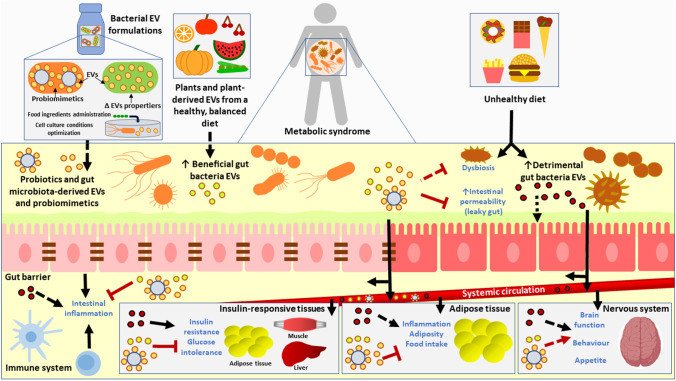Fig. 1.
Schematic model of the hypothetical impact of dietary patterns on gut microbiota extracellular vesicle profile, and the effect of probiotic- and gut microbiota–derived extracellular vesicles on metabolic syndrome onset and/or progression. A mechanism by which unhealthy dietary patterns could contribute to obesity and/or diabetes progression could be the promotion of gut microbiota dysbiosis and the enhancement of detrimental gut microbiota-derived extracellular vesicles amount. In turn, these extracellular vesicles could potentially impair gut barrier permeability and intestinal inflammation, and could be distributed to peripheral organs through systemic circulation, impairing metabolism and promoting inflammation, and subsequently aggravating the severity of metabolic disorders. Enhancement of beneficial gut microbiota extracellular vesicles through plants and plant-derived extracellular vesicles from healthy dietary patterns and/or the administration of formulations based of probiotic- and gut microbiota–derived extracellular vesicles could potentially be a strategy to treat metabolic disorders by counteracting dysbiosis, gut permeability increase, inflammation, metabolic homeostasis disturbances, and nervous-system derangements. Formulations based on bacterial extracellular vesicles could be optimized in order to increase their properties and effects by designing efficient therapeutic agents (i.e., probiomimetics, which are bacterial derived extracellular vesicles coupled to microvesicles), establishing optimal cell culture conditions or administrating certain food-ingredients. All the hypotheses presented in this model must be further confirmed; especially the ones marked with dashed arrows should be proven. Brain template from BioRender (https://biorender.com)

